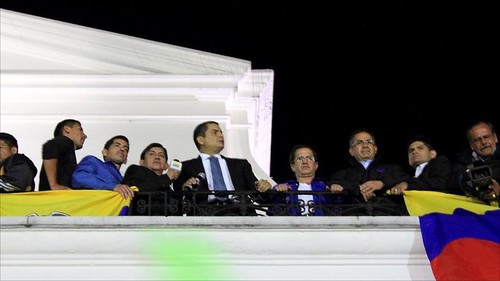
President Rafael Correa of Ecuador has prevailed over an attempted right-wing coup that was led by the police. The military leaders sided with the leftist government routing the coupmakers on October 1, 2010., a photo by Pan-African News Wire File Photos on Flickr.
Ecuador leader Rafael Correa celebrates re-election
7:06p.m. EST February 17, 2013
QUITO, Ecuador (AP) — President Rafael Correa, a dynamic but polemical leftist who has spent heavily on the poor, confidently celebrated his second re-election Sunday even before the first official results were announced.
An exit poll gave the incumbent, who first took office in 2007, 61% against 20% for his closest challenger, former banker Guillermo Lasso.
A beaming Correa appeared on state TV hugging jubilant supporters at the Carondelet presidential palace less than an hour after polls closed. Flanked by his immediate family and closest aides, he addressed a cheering crowd from its balcony.
"This victory is yours. It belongs to our families, to our wife, to our friends, our neighbors, the entire nation," Correa said. "We are only here to serve you. Nothing for us. Everything for you, a people who have become dignified in being free."
None of the other six candidates won more than 5%, according to the poll by Cedatos-Gallup. It interviewed 15,000 voters and had a 3.7 percentage point error margin.
The 48-year-old Correa has raised living standards for the lower classes and widened the welfare state with region-leading social spending. Critics including international human rights group call him a bully as intolerant of dissent as his Venezuelan ally, Hugo Chavez.
Correa has brought uncharacteristic political stability to this oil-exporting nation of 14.6 million people that cycled through seven presidents in the decade before him.
He won re-election in April 2009 after voters approved a constitutional rewrite that mandated a new ballot, and he would be legally barred from running again if victorious.
To avoid a runoff, Correa needed a simple majority or 40% of the vote plus a 10-point margin over the No. 2 vote-getter.
A champion of big government in the Chavez mold but more respectful of private property, Correa has endeared himself to the poor and lower middle class by making education and health care more accessible, building or improving 4,870 miles of highways and, the government says, creating 95,400 jobs in the past four years.
Lasso had promised a government friendlier to foreign investment, lower taxes on job-creating companies and a rolling back elements of what Correa calls his "21st century socialism," such as a 5% tax on capital removed from Ecuador.
Among voters casting their ballot for Correa in Quito was a grateful Jomaira Espinosa, 18.
"Before (Correa), my family didn't have enough to eat" and her father couldn't find work, she said. Now her father has a job as a public servant and she expects to be able to study for free at a university thanks to Correa's programs.
But Correa's critics say his "citizens' revolution" has been accompanied by his arbitrary wielding of a near-monopoly on state power against anyone who threatens it.
German Calapucha, a 29-year-old accountant, said he voted against Correa because he's tired of the president's imperiousness.
"He thinks that because he wins elections he has the right to mistreat people," Calapucha said. "I want a country where people respect each other."
Correa has eroded the influence of opposition parties, the Roman Catholic Church and the news media and used criminal libel law to try to silence opposition journalists. Critics lament his staking of courts with friendly judges and the government's prosecution of indigenous leaders for organizing protests against Correa's opening up of Ecuador to large-scale mining without their consent.
"He is far too insolent and I want there to be freedom of expression," said Laura Realpe, a 59-year-old housewife.
One blessing for Correa has been oil prices that have been hovering around $100 a barrel.
Petroleum accounts for more than half of Ecuador's export earnings and have allowed it to lead the region in 2011 in public spending as a portion of gross domestic product at 11.1% , according to the United Nations. Bolivia was second with 10.8%.
Voters such as Fabian Garzon, a 48-year-old messenger and cleaner, credit Correa with improving their lives.
Garzon has what he's always dreamed of: his own apartment, which he is buying with a $24,000 government-issued mortgage. His monthly salary, meanwhile, has more than doubled over the past four years, from $200 to $450, and payments for his social security, vacation and other government-mandated contributions are being made regularly.
"I worked 25 years without having my own house and at this age, thank God, I'm able to own my own home," Garzon said.
In all, 1.9 million people receive $50 a month in aid from the state. Critics complain that the popular handouts to single mothers, needy families and the elderly poor, along with other subsidies, have bloated the government.
The number of people working for the government has burgeoned from 16,000 to 90,000 during Correa's current term, Ecuador's nongovernmental Observatory of Fiscal Policy said in a December report.
Correa also has been unable to stop a growing sensation of vulnerability in a country where robberies and burglaries grew 30% in 2012 compared with the previous year.
The U.S.-educated Correa gained an early reputation as a maverick, defying international financiers by defaulting on $3.9 billion in foreign debt obligations and rewriting contracts with oil multinationals to secure a higher share of oil revenues for Ecuador.
He has also kept the United States at arm's length while upsetting Britain and Sweden in August by granting asylum at the Ecuadorean Embassy in London to WikiLeaks founder Julian Assange, the online spiller of leaked U.S. government secrets who is wanted for questioning in Sweden for alleged sexual assault.
Correa has cozied up to U.S. rivals Iran and China. The latter is the biggest buyer of Ecuador's oil and holds $3.4 billion in Ecuadorean debt, Finance Minister Patricio Rivera says.
No comments:
Post a Comment